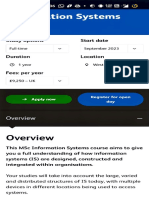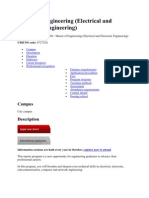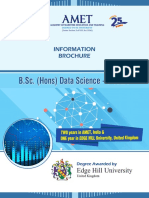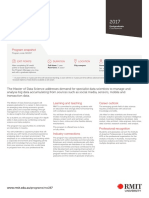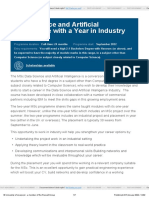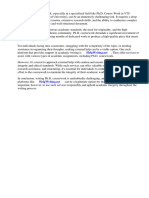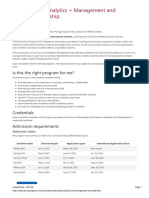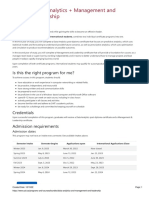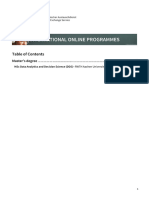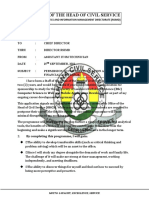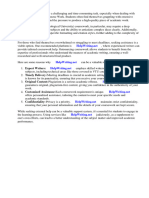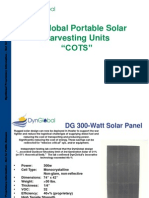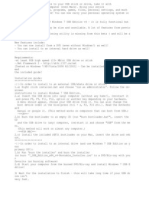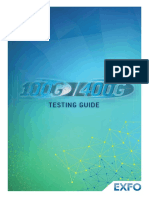PG Course PDF Tesside
PG Course PDF Tesside
Uploaded by
Ashwin VargheseCopyright:
Available Formats
PG Course PDF Tesside
PG Course PDF Tesside
Uploaded by
Ashwin VargheseOriginal Title
Copyright
Available Formats
Share this document
Did you find this document useful?
Is this content inappropriate?
Copyright:
Available Formats
PG Course PDF Tesside
PG Course PDF Tesside
Uploaded by
Ashwin VargheseCopyright:
Available Formats
© Teesside University: Postgraduate courses: MSc Artificial Intelligence with Data Analytics
Artificial Intelligence with Data Analytics
MSc
Full-time and Part-time Computing &
Cybersecurity
UK students: apply now to start in September or January. Apply now
International students: due to high volumes, applications received after 1 October 2021 cannot be considered for January 2022
entry.
Full-time Part-time
Page 1 of 5 Date printed from www.tees.ac.uk: 21/11/2021
© Teesside University: Postgraduate courses: MSc Artificial Intelligence with Data Analytics
Full-time Part-time
2021/22 entry 2021/22 entry
Fee for UK Fee for UK applicants
£6,695 a year £745 for each 20 credits
£4,335 a year with advanced practice More details about our fees
More details about our fees
2022/23 entry
Fee for international applicants
Fee for UK applicants
£13,000 a year
£745 for each 20 credits
£7,500 a year with Advanced Practice
More details about our fees
More details about our fees for international applicants
Length: Up to 3 years (can be completed in 2 years if
preferred)
2022/23 entry
Start date: September or January
Fee for UK applicants
Semester dates
£6,695 a year
Apply online (part-time)
£4,335 a year with advanced practice
Apply online (fast-track) for current students
More details about our fees
Fee for international applicants
£14,000 a year
£8,500 a year with advanced practice
More details about our fees for international applicants
Length: within 1 year (September start), 16 months
(January start) or 2 years with advanced practice
(September or January start)
Start date: September or January
Semester dates
Apply online (full-time)
Apply online (fast-track) for current students
Get in touch
UK students
Email: scedtadmissions@tees.ac.uk
Telephone: 01642 738801
Online chat
International students
Email: internationalenquiries@tees.ac.uk
Telephone: +44 (0) 1642 738900
More international contacts
Page 2 of 5 Date printed from www.tees.ac.uk: 21/11/2021
© Teesside University: Postgraduate courses: MSc Artificial Intelligence with Data Analytics
Course overview
The MSc Artificial Intelligence with Data Analytics course is designed for graduates seeking to build on your existing
skills to develop specific expertise in the field of artificial intelligence and data analytics.
You strengthen and deepen your skills on the cutting edge of computer science and are prepared to make the transition from
programmers to team leaders and designers. Particular features include:
In addition to major themes of artificial intelligence and data analytics, you also focus on a supporting strand of statistical
methods and research methods to provide the academic rigour required for postgraduate study and the practical skills for
entry to industry.
You experience new trends pervading the software industry that influence a wide range of applications, from supply chain
analysis to pharmaceutical manufacture.
You benefit from a range of authentic and engaging learning experiences and assessments.
It is particularly suited to overseas students who wish to develop practical and cutting edge skills for entry to their local
computer science industry.
The fixed module diet presents a unique course that encapsulates leading edge skills, solid programming experience,
research expertise and industry experience.
If you take the two year course the Advanced Practice (internship) provides an opportunity to improve employment prospects by
providing real-world experience to develop new skills and a deeper understanding of the subject.
Course details
Course structure
Core modules
Artificial Intelligence Ethics and Applications
You gain a deep insight into the business applications of artificial intelligence (AI) and data science (DA). You explore a range of
AI and DS applications such as chatbots, virtual assistants, medical diagnosis, biometric recognition, personalisation, fraud
detection and autonomous machines, and analyse both the risks and opportunities of applying AI and DS techniques in these
areas.
Computing Master's Project
You undertake a major, in-depth, individual study in an aspect of your course. Normally computing master’s projects are drawn
from commercial, industrial or research-based problem areas. The project involves you in researching and investigating aspects
of your area of study and then producing a major deliverable, for example software package or tool, design, web-site and
research findings. You also critically evaluate your major deliverable, including obtaining third party evaluation where appropriate.
The major deliverable(s) are presented via a poster display, and also via a product demonstration or a conference-type
presentation of the research and findings. The research, project process and evaluation is reported via a paper in the style of a
specified academic conference or journal paper. The written report, the major deliverable and your presentation of the product are
assessed.
The project management process affords supported opportunities for goal setting, reflection and critical evaluation of
achievement.
Data Analytics
This module provides you with the core principles and practical skills to apply state-of-the-art computational methods to perform
data analytics. The skills are very important in the new horizon of data analysis where existing massive amount of data contains
valuable knowledge, which is critical for prediction and decision-making. Due to its characters (3V: volume, velocity, and variety),
computational methods are required to extract such knowledge.
You form a solid foundation of both descriptive and predictive analytics, which refers to tools and techniques for building
statistical or machine learning models to make predictions and decisions based on data. Practical guidance about how to handle
unlabelled, noisy, incomplete, large-scale data is discussed and you learn how to select the best technique to handle different
type of data in different scenarios.
Intelligent Decision Support Systems
You focus on the fundamentals of tackling decisions of increasing difficulty in technology, health and business decision, and gain
an understanding about the need for, and the effectiveness of, computerised methods for supporting decisions. This includes
classifications, data mining and knowledge management-based decision methods with examples of various application domains.
You will be provided with the opportunity to implement simple computerised decision support systems applied to specific real-life
problems. The process and practices develop your ability to build simple versions of decision support systems and familiarity with
full-scale versions of decision support systems for various application domains.
Page 3 of 5 Date printed from www.tees.ac.uk: 21/11/2021
© Teesside University: Postgraduate courses: MSc Artificial Intelligence with Data Analytics
Machine Learning
Machine learning is a subfield of computer science concerned with computational techniques rather than performing explicit
programmed instructions. You build a model from a task based on observations in order to make predictions about unseen data.
Such techniques are useful when the desired output is known but an algorithm is unknown, or when a system needs to adapt to
unforeseen circumstances.
You explore statistics and probability theory as the fundamental task is to make inferences from data samples. The contribution
from other areas of computer science is also essential for efficient task representation, learning algorithms, and inferences
procedures. You gain exposure to a breadth of tasks and techniques in machine learning.
Assessment is an in course assessment (100%).
Research and Development
You gain the knowledge and skills to understand the research process in computing and digital media, and the necessary skills to
undertake your masters project. You learn how to use and critically evaluate previous academic research, and to generate good
evidence material to justify their professional practice. This involves you learning about different research strategies and data
generation methods and how they fit into the development lifecycle and the evaluation of the user experience, the use of the
academic research literature, and research ethics.
Assessment involves you preparing a research proposal which can form the basis of your master's project.
Statistical Methods for Data Analytics
You develop necessary knowledge and practical understanding of the main statistical techniques. You explore quantitative and
qualitative data analysis techniques, reflecting scientific and social science methods. You focus on correlation testing, regression,
data categories, normalization - the tools needed, rather than the philosophical approaches. You understand how to apply valid
techniques and interpret the results in preparation for experimental work.
Your assessment is a single ICA based around a number of case studies that require you to identify the correct data analysis
and modelling processes.
Advanced practice (2 year full-time MSc only)
Internship
The internship options are:
Vocational: spend one semester working full-time in industry or on placement in the University. We have close links with a range
of national and international companies who could offer you the chance to develop your knowledge and professional skills in the
workplace through an internship. Although we cannot guarantee internships, we will provide you with practical support and advice
on how to find and secure your own internship position. A vocational internship is a great way to gain work experience and give
your CV a competitive edge.
Research: develop your research and academic skills by undertaking a research internship within the University. Experience
working as part of a research team in an academic setting. Ideal for those who are interested in a career in research or academia.
Modules offered may vary.
How you learn
You learn about concepts and methods primarily through keynote lectures and tutorials using case studies and examples.
Lectures include presen-tations from guest speakers from industry. Critical reflection is key to successful problem solving and
essential to the creative process. You de-velop your own reflective practice at an advanced level, then test and assess your
solutions against criteria that you develop in the light of your research.
How you are assessed
The programme assessment strategy has been designed to assess your subject specific knowledge, cognitive and intellectual
skills and transferable skills applicable to the workplace. The strategy ensures that you are provided with formative assessment
opportunities throughout the programme which support your summative assessments. The assessments will include
assignments, tests, case studies, presentations, research proposal and literature review, and the production of a dissertation. The
assessments may include individual or group essays or reports. The assessment criteria, where appropriate, will include
assessment of presentation skills and report writing.
Entry requirements
You will normally have a first degree in related discipline (2.2 minimum) or relevant experience or equivalent qualifications.
Acceptable subjects include artificial intelligence, computer forensics, computer science, computing, information technology,
artificial intelligence, data science, computer forensics and digital forensics.
Page 4 of 5 Date printed from www.tees.ac.uk: 21/11/2021
© Teesside University: Postgraduate courses: MSc Artificial Intelligence with Data Analytics
In addition, international students will require IELTS 6.0 or equivalent.
For general information please see our overview of entry requirements
International applicants can find out what qualifications they need by visiting Your Country
Information for international applicants
Qualifications
International applicants - find out what qualifications you need by selecting your country below.
Select your country:
Choose
Useful information
Visit our international pages for useful information for non-UK students and applicants.
Talk to us
Talk to an international student enrolment adviser
Page 5 of 5 Date printed from www.tees.ac.uk: 21/11/2021
You might also like
- Teesside University CourseDocument6 pagesTeesside University CourseRas Tanura 2021No ratings yet
- CompTIA Security+ SY0-601 Exam Objectives (3.0)Document28 pagesCompTIA Security+ SY0-601 Exam Objectives (3.0)Treylan RNo ratings yet
- Wankel MQP Final ReportDocument28 pagesWankel MQP Final Reportnick chasiotisNo ratings yet
- A6V10210424Document214 pagesA6V10210424doruman100% (2)
- PG Course PDFDocument5 pagesPG Course PDFwsv zvkvjNo ratings yet
- MSC Information System InformationDocument16 pagesMSC Information System InformationVishal Deep SarangalNo ratings yet
- M.Tech.: Data Science & EngineeringDocument16 pagesM.Tech.: Data Science & EngineeringMahesh GautamNo ratings yet
- Coursework NtuDocument7 pagesCoursework Ntuafjwoamzdxwmct100% (2)
- RmitDocument16 pagesRmitmansoor.ahmed100No ratings yet
- BTSDSB2018Document18 pagesBTSDSB2018vasuammaNo ratings yet
- Information Technology NonrecruitingDocument13 pagesInformation Technology NonrecruitingHabeeba UnnisaNo ratings yet
- B.Sc. (Hons) Data Science - 3 Years B.Sc. (Hons) Data Science - 3 YearsDocument12 pagesB.Sc. (Hons) Data Science - 3 Years B.Sc. (Hons) Data Science - 3 YearsSahil FarazNo ratings yet
- MC 267Document2 pagesMC 267abhisekNo ratings yet
- Data Science and Artificial IntelligenceDocument7 pagesData Science and Artificial IntelligenceAswin MNo ratings yet
- Uwl4623 PGP Computer-Tech VawDocument4 pagesUwl4623 PGP Computer-Tech VawalikhanNo ratings yet
- M.Tech.: Data Science & EngineeringDocument20 pagesM.Tech.: Data Science & EngineeringNEHA BANSALNo ratings yet
- Progspec MSC Data Science 2022 23Document20 pagesProgspec MSC Data Science 2022 23shaaficihussein19102022No ratings yet
- Teesside University CourseDocument7 pagesTeesside University CourseMuhammad HasnainNo ratings yet
- Progspec MSC Datascience Ai 2019 20Document15 pagesProgspec MSC Datascience Ai 2019 20currecurreNo ratings yet
- Data Science and Analytics MSC 2023-24-0Document10 pagesData Science and Analytics MSC 2023-24-0Edeh MichaelNo ratings yet
- Civil Engineering Surveying BSC HonsDocument11 pagesCivil Engineering Surveying BSC HonsAeron Gamo BaldovinoNo ratings yet
- PG Course PDFDocument5 pagesPG Course PDFHumza SulheriNo ratings yet
- BTSDSB2018Document21 pagesBTSDSB2018tkrishaNo ratings yet
- Vtu PHD Course Work 2013Document8 pagesVtu PHD Course Work 2013rqaeibifg100% (2)
- MSC Prospectus For StuartDocument42 pagesMSC Prospectus For StuartAnonymous PL4XsFgrNo ratings yet
- CityU PDFDocument4 pagesCityU PDFSiuzanna KaragulovaNo ratings yet
- G5U0 MSC Advanced Computing 2023 24Document10 pagesG5U0 MSC Advanced Computing 2023 24Sunil Kumar BhramarNo ratings yet
- Stuart GCUDocument6 pagesStuart GCUAnonymous PL4XsFgrNo ratings yet
- PHD Course Work in VtuDocument4 pagesPHD Course Work in Vtutvanfdifg100% (2)
- School of Natural and Computing Sciences Postgraduate Guide: WWW - Abdn.ac - Uk/ncsDocument16 pagesSchool of Natural and Computing Sciences Postgraduate Guide: WWW - Abdn.ac - Uk/ncsAltif AboodNo ratings yet
- Programme Specification Law, Artificial Intelligence and New Technologies Taught Masters 2023 24Document16 pagesProgramme Specification Law, Artificial Intelligence and New Technologies Taught Masters 2023 24agboobinnayagodsonNo ratings yet
- Data AnalysisDocument3 pagesData AnalysisAaNo ratings yet
- BSC Computer Science PathwaysDocument27 pagesBSC Computer Science PathwaysChristian DukundeNo ratings yet
- SPP 42 Series Stream C Proposal Format-1Document11 pagesSPP 42 Series Stream C Proposal Format-1Farook KhanNo ratings yet
- Progspec MSC Datascience Fin Tech 2019 20Document15 pagesProgspec MSC Datascience Fin Tech 2019 20currecurreNo ratings yet
- BhugDocument17 pagesBhugCHIRRA MOUNIKA REDDYNo ratings yet
- Progspec MSC Datascience 2019 20Document15 pagesProgspec MSC Datascience 2019 20currecurreNo ratings yet
- Otro Curso Mas para Estudiar en Canda Como ExtranjeroDocument3 pagesOtro Curso Mas para Estudiar en Canda Como ExtranjeroN AMDNo ratings yet
- Bachelor of Information Technology - Southern Cross UniversityDocument8 pagesBachelor of Information Technology - Southern Cross UniversityAbel WilliamsNo ratings yet
- Total Indicative Course Fee $97,600 Indicative Year 1 Fee $32,200Document5 pagesTotal Indicative Course Fee $97,600 Indicative Year 1 Fee $32,200rodinibNo ratings yet
- BSC Computer Science 202021Document9 pagesBSC Computer Science 202021Ortega GodwinNo ratings yet
- PG Diploma in Data Science 2019Document5 pagesPG Diploma in Data Science 2019Balaji SNo ratings yet
- G5K823: Master of Data Science: EssentialsDocument8 pagesG5K823: Master of Data Science: EssentialsAomamNo ratings yet
- Carreras para Extranjeros en Canada 2.1210Document3 pagesCarreras para Extranjeros en Canada 2.1210N AMDNo ratings yet
- BSC Hons Computing With Cyber Security TechnologyDocument7 pagesBSC Hons Computing With Cyber Security TechnologyAnino MaminorNo ratings yet
- Admission Brochure 21-22 GeneralDocument68 pagesAdmission Brochure 21-22 GeneralMistyNo ratings yet
- Vnsgu PHD ThesisDocument7 pagesVnsgu PHD Thesiscarliferranteolathe100% (2)
- Simple Thesis Topics For Mechanical EngineeringDocument5 pagesSimple Thesis Topics For Mechanical Engineeringbsam2hwd100% (2)
- MSC Data Analytics and Decision Science (DDS) RWTH Aachen University - AachenDocument9 pagesMSC Data Analytics and Decision Science (DDS) RWTH Aachen University - AachenHieu NguyenNo ratings yet
- Request For Financial SupportDocument10 pagesRequest For Financial SupportEmmanuel NorteyNo ratings yet
- MSC Web and Mobile Development Technologies Part TimeDocument9 pagesMSC Web and Mobile Development Technologies Part Timedavitech44No ratings yet
- Important Notice: Computer Studies 7010 GCE O Level 2007Document29 pagesImportant Notice: Computer Studies 7010 GCE O Level 2007mstudy123456No ratings yet
- BrochureDocument8 pagesBrochureSwapnil1 SBNo ratings yet
- Coursework For PHD VtuDocument4 pagesCoursework For PHD Vtubcqv1trr100% (2)
- PHD Coursework Question PapersDocument6 pagesPHD Coursework Question Papersnjoqvnjbf100% (2)
- MA Data Science 2022Document22 pagesMA Data Science 2022Safin IslamNo ratings yet
- Vtu Course WorkDocument7 pagesVtu Course Workf67m6abx100% (2)
- BrochureDocument4 pagesBrochureRajulNo ratings yet
- PGD in Business AnalyticsDocument12 pagesPGD in Business AnalyticsSahithi DakamarriNo ratings yet
- Information Brochure: A Place To Learn A Chance To GrowDocument12 pagesInformation Brochure: A Place To Learn A Chance To GrowNoorNo ratings yet
- YZ1 - Big Data Streaming AnalyticsDocument2 pagesYZ1 - Big Data Streaming AnalyticsSyed Imran Ali KazmiNo ratings yet
- Career GuidanceDocument12 pagesCareer Guidancemonicahwangari640No ratings yet
- IoT Streams for Data-Driven Predictive Maintenance and IoT, Edge, and Mobile for Embedded Machine Learning: Second International Workshop, IoT Streams 2020, and First International Workshop, ITEM 2020, Co-located with ECML/PKDD 2020, Ghent, Belgium, September 14-18, 2020, Revised Selected PapersFrom EverandIoT Streams for Data-Driven Predictive Maintenance and IoT, Edge, and Mobile for Embedded Machine Learning: Second International Workshop, IoT Streams 2020, and First International Workshop, ITEM 2020, Co-located with ECML/PKDD 2020, Ghent, Belgium, September 14-18, 2020, Revised Selected PapersNo ratings yet
- Honda TQMDocument11 pagesHonda TQMPrayansh JainNo ratings yet
- Creating NotificationsDocument1 pageCreating NotificationsUtsavTripathiNo ratings yet
- RC Phase Shift Oscillator 230510 - 195846Document32 pagesRC Phase Shift Oscillator 230510 - 195846Pranav msNo ratings yet
- Fuji MCCBDocument234 pagesFuji MCCBElias Adiel Madangi WigunaNo ratings yet
- BBA 6th Management Information SystemDocument8 pagesBBA 6th Management Information SystemRakesh PatelNo ratings yet
- CyberbiosecurityDocument3 pagesCyberbiosecuritywatson191No ratings yet
- 1.3.1.6 Lab - Threat IdentificationDocument2 pages1.3.1.6 Lab - Threat IdentificationFahadNo ratings yet
- DynGlobal Portable Solar 2012Document25 pagesDynGlobal Portable Solar 2012solsysNo ratings yet
- Sales Order Management Process For Sap Terp10Document1 pageSales Order Management Process For Sap Terp10pbtg100% (1)
- Kyocera 250ciDocument2 pagesKyocera 250ciNasser HashimNo ratings yet
- Tiger T650 FULLDocument44 pagesTiger T650 FULLSolomon TekalignNo ratings yet
- ULPI Design Guide: 1.1 ReferencesDocument20 pagesULPI Design Guide: 1.1 ReferencesMizo QuizNo ratings yet
- IBM XIV Gen3 Storage System: Performance and Ease of UseDocument38 pagesIBM XIV Gen3 Storage System: Performance and Ease of UseSri KantaNo ratings yet
- JMR Ksba20Document2 pagesJMR Ksba20Ashok KumarNo ratings yet
- Applications of Hydraulics-PneumaticsDocument13 pagesApplications of Hydraulics-PneumaticsÖzgür DalNo ratings yet
- Esquema Eletrico CI S1a0071xDocument20 pagesEsquema Eletrico CI S1a0071xGiovani BragaNo ratings yet
- 6HP19 21Document31 pages6HP19 21dannn12No ratings yet
- Better Data Science - Generate PDF Reports With PythonDocument5 pagesBetter Data Science - Generate PDF Reports With PythonDerek DegbedzuiNo ratings yet
- Cisco CCNA Security Module 4Document9 pagesCisco CCNA Security Module 4pollypolNo ratings yet
- Read Me FirstDocument2 pagesRead Me FirstCristian StancuNo ratings yet
- Connecting and Communicating OnlineDocument8 pagesConnecting and Communicating OnlineAngelene CalivaNo ratings yet
- Ict MCQDocument140 pagesIct MCQmahirimtiaz054No ratings yet
- Avoid Common Mistakes When Specifying Burner Management SystemDocument5 pagesAvoid Common Mistakes When Specifying Burner Management SystemHsein WangNo ratings yet
- 6.HELIAX SureFlex SureGuard Update V1 08-27-14 - Braatz PDFDocument12 pages6.HELIAX SureFlex SureGuard Update V1 08-27-14 - Braatz PDFanon_80172407No ratings yet
- Virtual Christmas Party 2021Document12 pagesVirtual Christmas Party 2021Elton John Santos CapiliNo ratings yet
- Morgan Stanley - Technology Analyst JD (App Dev Track)Document3 pagesMorgan Stanley - Technology Analyst JD (App Dev Track)Ghost GopalNo ratings yet
- Exfo Guide 100g-400g enDocument128 pagesExfo Guide 100g-400g enJose SanchezNo ratings yet





